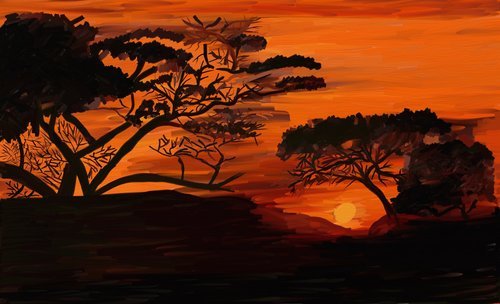
Abasi refers to the Supreme Creator
God in the language of the Efik people of Nigeria and Cameroon. The Efik people
are a branch of the Ibibio, who are often called Calabar. The Efik have devised
an elaborate narrative about the existence and function of the Almighty God, Abasi.
Although there are variations to the account as given by the elders and priests
of the people, the general contours of the account are the same.
According to the belief of the
Efiks, the wife of Abasi, whose name was Atai, convinced him to allow their
adult children, one man and one woman, to settle on the Earth, but to prohibit
them from reproducing or working the land. The idea, according to Efik
understanding, was that the children should depend on their father and mother
for shelter, food, and protection. However, the children resented these
prohibitions and soon returned to heaven when Abasi called them to eat food
when they became hungry. While they were in the sky with Abasi and Atai, the
children explored many things; they learned to create, sing, make musical instruments,
and make food. This was not pleasing to Abasi, and wanting to protect him, Atai
did everything to prevent the children from exceeding Abasi in wisdom, power,
and strength. Atai believed that if the children exceeded their father in
knowledge and wisdom, there would be great chaos in the universe. The children,
of course, like other children, wanted to see how far they could go without
being chastised or prevented from their activities. Atai was so disturbed by
this that she set her mind on preventing a rebellion at all costs. She loved
the children but watched them care-fully, yet the children eventually broke the
rules that had been established by Abasi. They could not live in peace with
Abasi and Atai and there-fore were forced to leave the sky again. The son and
daughter returned to Earth with their limited knowledge and violated most of
Abasi’s rules. They had many children and worked on the land creating many
items for living. Soon they caused strife, heartbreak, tensions, jealousy,
hatred, war, and death among their own children. Abasi and Atai were so
disgusted with the happenings on Earth and with the affairs of their own
children and their grandchildren that the two deities soon withdrew to the sky,
leaving humans to deal with their own affairs. This is why Abasi is not known
to be involved in the ordinary lives of the people. He created the universe and
all things that are in it and then, after failing to control his own human
creation, retired to the far reaches of the sky.
Therefore, for ordinary issues of
taboos and rituals, the Efik people must rely on strong ancestral spirits,
sometimes in societies of secrets, to assist them with the manifold problems
and concerns of daily living. They have no possibility of coaxing Abasi to
return to their society to give advice or wisdom; this is now the affair of
lesser spirits.
What are your thoughts?
References
Quarcoopome, T. N. (1987). West
African Traditional Religion. Ibadan: African Universities
Press.
Scheub, H. (2000). A Dictionary
of African Mythology.New York: Oxford University Press.
Smith, E. W. (Ed.). (1950). African
Ideas of God: A Symposium. London:
Edinburgh House.

Comments
Post a Comment